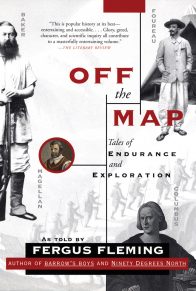In December 1880 the River Loire froze, giving Lieutenant Vicomte Charles de Foucauld the chance to hold an evening party for his fellow officers of the Fourth Hussars. By Parisian standards it was not particularly grand – a provincial f”te-champ”tre, at best – but there was no denying its host had a sense of style. When his guests descended from their carriages they were greeted by a remarkable sight. There, on the ice, Foucauld had created an al fresco ballroom: a section of the Loire had been roped off as a dance floor; a band was playing the latest tunes; on the bank, sideboards groaned under the weight of Parisian delicacies; meanwhile, vats of blazing rum punch cast a bluish glow over the scene. Everything had been taken care of, including the provision of skates for each officer, their shoe sizes having been obtained beforehand from the regimental quartermaster.
As Foucauld’s guests cavorted over the ice, a sleigh carved in the shape of a swan drew up amidst a circle of flaming brands. It contained Foucauld’s fur-swaddled mistress, Mimi.
She was, he declared, their ‘honorary colonel’ for the evening. Breaking into song, the men whirled the sleigh across the dance floor while Foucauld skated casually alongside, murmuring to his mistress. He had news: orders had just come in, the Fourth Hussars were being posted to Algeria. Mimi, however, was not to worry. He was sure she could accompany him, and the move would do both of them good. As the jaded young aristocrat explained, ‘I need a change of scene.’
From Tunisia, the fertile zones of North Africa comprise a narrow strip of land that stretches west to Morocco, where the Atlas mountains, which form their southern boundary, dip southwards to create a triangular wedge of prosperity on the Atlantic coast. As one nineteenth-century writer put it, the effect is that of a verdant forage cap perched on the great, bald head of the continent. In the middle of this strip, sandwiched between Tunisia and Morocco, lies Algeria. Topographically, Algeria differs little from its neighbours: a Mediterranean littoral – the Sahel – followed by a stretch of good, crop-growing land – the Tell – and then a series of high valleys, suitable mainly for grazing – Les Hauts Plateaux – beyond which the snow-clad mountains plunge abruptly to the Sahara. Its cultivable area is small, extending approximately 250 kilometres inland from 900 kilometres of shoreline. Its history, however, is rich.
The Berbers, a pale-skinned race of semi-pastoralists, claim priority as the first inhabitants of North Africa. Their tutelage was disrupted by the Phoenicans, who set up coastal trading stations, the most impressive of which was Carthage. Later, the Ancient Romans assumed control of their possessions, moving inland to create substantial colonies whose main purpose was the harvesting of wheat and the processing of resources from the African interior – ivory, gold, feathers, furs, wild animals for the circuses and, above all, slaves. Between 800 and 1100 AD, as Arab invaders swept across North Africa and into Spain, Roman control gave way to a succession of Islamic dynasties. Then, in the seventeenth century, Algeria came under the sway of the Ottomans, forming the western limit of a vast empire that stretched eastward to Persia and all but encircled the Mediterranean. Ottoman rule, however, was weak. Theoretically under the fist of Constantinople, its outlying territories were run in practice by local rulers who paid mere lip service to the Sultan. One such ruler was the Dey of Algeria. It took the Deys very little time to realize that they could do more or less as they wished and that, while the trade in slaves continued very profitably, they could also, with the covert blessing of the Sultan, make a lot of money from piracy.
Algeria, or the Barbary Coast as Europeans knew and feared it, became the scourge of the Mediterranean – and of the Atlantic too. In 1644, Barbary pirates raided the British port of Penzance, seizing sixty people to be sold as slaves; forty-four years later they took 237 men, women and children from the Irish port of Baltimore. In the same century, so voluminous were the crowds of women, who came to London seeking restitution for breadwinners lost to Barbary corsairs, that Parliament allocated them the fines levied on Members who were late for morning prayers. It helped the women little and had no deterrent effect on the corsairs, whose reputation was by now so widespread that a group of Japanese pirates came to join in the fun. For two centuries the Barbary Coast disrupted European shipping with virtual impunity and in blithe disregard of world politics. In 1810, during the Napoleonic War, when Britain supposedly ruled the waves, Sir Arthur Paget, Commander of HMS Thetis, was forced to exchange a gold snuff-box valued at “500 for two British captives held by the pirates; in the same year London’s Company of Ironmongers paid “465 for the return of another thirteen. This was too much. In 1816 a Royal Navy squadron anchored off Algiers and blew the pirates, their ships and their port to smithereens. Troops were sent to invest the rubble, which they did with notable success, using some of it to construct a new pier, before sailing home with the satisfaction that the Dey had been taught a lesson.
In 1830, France decided that the Dey needed another lesson – this time in manners. During the past fifteen years, the world had become increasingly interested in Ottoman North Africa. Nations as far afield as America and Sweden were intrigued by its commercial possibilities and despatched so-called ‘Consuls’ to pursue their interests. In every major port, therefore, could be found a group of foreigners – adventurers and spies for the most part – who manoeuvred for advantage in the eyes of the local ruler. The Deys of Algeria, however, kept a sharper eye on accounts than did most other rulers and in 1828 the current Dey invited the French Consul to discuss a debt that had been outstanding since the 1790s for a consignment of wheat. When the Consul refused to countenance payment, the Dey became so outraged that he struck the man with his fly whisk. For Charles X, the unpopular Bourbon monarch who had been placed on the French throne following the defeat of Napoleon, this was a perfect opportunity to detract attention from his failings at home. Declaring the incident ‘an insult to the national honour’, he put Algiers under blockade. It was, alas, a seasonal blockade, and as soon as the French ships left for the winter, Algerian pirates snatched three ships from the Bay of Naples, sold them in Tangiers and returned home with the proceeds.
Therefore, in 1830, France inflicted a second bombardment on Algiers and sent marines to occupy the port. To the marines’ surprise they met almost no resistance, so they moved inland. The process was repeated along the coast, at the ports of Oran and B”ne. By the end of the year, France, which had intended at first only to rid the Mediterranean of a nuisance, and maybe at the same time flex its muscles on the international stage, found itself in possession of a small colony. Charles X would have been pleased, had he still been in power. He had, however, been deposed and his successor, Louis Philippe, the ‘Citizen King’, a ruler of more popularity and greater caution, needed no such venture to bolster his regime. In fact, colonization was the last thing he wanted. Afflicted, almost uniquely in Europe, by a diminishing population, and with its finances in disarray, France had neither the money nor the people to support new overseas possessions. To the government’s dismay, its North African territory continued to expand. It was not a matter of policy but of practicality: once they had recovered from the initial shock, tribal leaders did their utmost to prevent the French advancing inland and the military responded by securing their outer limits or, as one commentator put it, ‘the presence of enemies induced battle’. Under the command of, among others, the grizzled veteran General Thomas-Richard Bugeaud, French troops marched ever deeper into Algeria.
For the invaders it was a glorious and exciting prospect, a chance to display their martial prowess and to prove that, despite the ignominy of Waterloo, they were still a formidable power. All they had to do to take Algeria was smite a few natives armed with swords, spears and the occasional musket. But, as they soon discovered, this was a land in which European notions of warfare did not apply. Massed battalions, long baggage trains and heavy artillery worked well enough in the urbanized coastal regions; but in the countryside matters were not so simple. The logistics alone were a nightmare. How was an offensive force and all its supplies to be hauled through a trackless, occasionally marshy and often mountainous hinterland? How were these cumbersome columns to defend themselves against a foe that refused to fight set-piece battles but pestered them with skirmishes and midnight raids, vanishing into the bush whenever artillery was brought into play? The French response was to advance by construction, consolidating each hard-won piece of territory by means of a fortified redoubt in which they could regroup before moving on. The result became one of the clich’s of North African conquest: white soldiers huddled in mud-brick forts, awaiting the doubtful arrival of supplies, while disease and guerrilla action took their toll. Even the Foreign Legion failed to make an impression. Created in 1831 to siphon off undesirable elements of France’s alien population, it fought its first battles in Algeria and later made its headquarters in the territory south of Oran. But, notorious as it was for its brutality, it, too, became just another part of the beleaguered garrison.
In the first year of their conquest the French had uttered vague promises about the rights of the natives: they could retain their property, their religion would be respected; they would be treated fairly. Some, predominantly those around the towns and in the agricultural zone of the Tell, had believed these promises, assuming that they had merely exchanged rule by the Ottomans for rule by the French. ‘Far from being hostile to us, the Moors are friends of our civilization,’ wrote one observer. ‘By treating them well, by according them liberty and security, we will find the most useful support among them.’ It soon became obvious, however, that the promises were empty: one of
France’s first acts was to transform Algiers’ Ketchawa Mosque into a church; Muslim feast days were no longer recognized as legal holidays; and large stretches of farmland were confiscated and handed over to colonists. As the occupation continued, resentment increased. There had always been divisions within the Algerian population, the main one being that between the coastal regions, inhabited by Arab communities, and the highlands, which were occupied by Berbers. The two groups did not share a common language – Berbers spoke their own tongue, with numerous dialects. They were also at odds in their religion: while both practised Islam, the Berbers pursued their own, unorthodox version that incorporated ancient, pre-Islamic customs. And their lifestyles differed – the Arabs were settled farmers, the Berbers were pastoralists. The French had hoped to exploit these differences but, to their dismay, both parties now came together in opposition against them.
In the colony’s outlying territories, settlers protected their villages with ditches, walls and watchtowers. When they emerged to till their fields they did so in armed groups and kept an eye out for the black flag that was raised to warn them of danger. Raids were commonplace, torchings, kidnaps and murders a matter of weekly occurrence. Initially, the attacking tribesmen ransomed their hostages; latterly, they just decapitated them, finding that the colonists would pay as much for a head as they would for the living person. The settlers replied in kind, with or without military assistance. Outside the narrow coastal strip, where some order reigned and whose native inhabitants actually volunteered to serve in the French army, Algeria was a bloody and very unpleasant place. Yet still Frenchmen wanted to live there. Displaced aristocrats who had been supporters of Charles X – they were nicknamed the ‘gants jaunes’ or ‘yellow gloves’ – built large estates from which they enriched themselves while remaining in the safety of the city. Property speculators were attracted by the promise of quick, if dangerous, profits: on seeing that a rebellious village was about to fall, one land agent rushed in with his wallet; the conquering officer had to pay the man several thousand francs for the land on which he wanted to construct his fort, plus a premium for the parade ground. And even in the most dangerous areas settlers were united by a frontier spirit – the land might not have been theirs originally, but having shed blood for it, they were not going to give it up.
Paris fretted. In 1834 M. Dupin, Procureur-g”n”ral, told the French Assembly that ‘The thing to do was to reduce expenditure to the lowest possible limit, and hasten in every way the moment that would free France from a burden which she could not and would not support much longer.’ Three years later, M. Thiers, Foreign Minister, said: ‘If we could secure a few leagues of land around Algiers, Oran and B”ne, I should for my part be satisfied. I am no friend of a general occupation.’ Even at the front there were doubts. While dealing with his elusive enemy, a process that involved variously victory, submission, double-dealing and a corrupt but highly profitable bit of arms-dealing, General Bugeaud insisted that his task was a complete waste of time. ‘Unfortunately,’ wrote one of his officers, ‘he professes these opinions all day, to every one, and at the top of his voice, which, although he may not be aware of it, is rather discouraging to the army.’ Nevertheless, it was thanks to Bugeaud that Algeria was finally vanquished. Discarding traditional European methods, he created a force of light infantry that moved swiftly, living off the land by means of razzia, or raids, in the same manner as its opponents. As one veteran described it, ‘In Europe, once [you are] master of two or three large cities, the entire country is yours. But in Africa, how do you act against a population whose only link with the land is the pegs of their tents? … The only way is to take the grain which feeds them, the flocks which clothe them. For this reason, we make war on silos, war on cattle, [we make] the razzia.’
Bugeaud’s tactics were ideally suited to their context, and gave rise to a second clich” of colonial warfare, that of the infantry square blazing defiantly at circling hordes of savages.
Continues…
Copyright ” 2003 by Fergus Fleming. Reprinted with permission from Grove Atlantic, Inc. All rights reserved.













